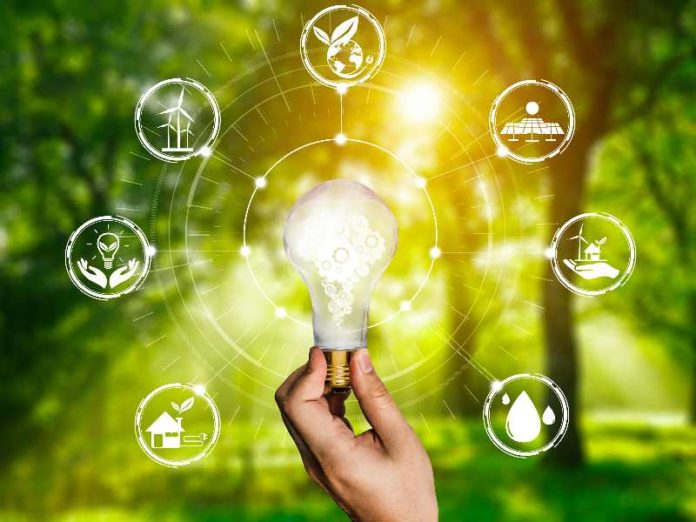
The Electricity System Operator’s Future Energy Scenarios (FES) study outlines four different pathways for the future of energy between now and 2050.
The scenarios range from a less ambitious plan to decarbonising the energy system, to a much more ambitious approach.
Researchers found that strategically investing in infrastructure to onboard clean energy, making the system smarter and more flexible and reforming the wholesale electricity market would unlock benefits. It could also reduce dependence on foreign energy to insulate economy from geopolitical shocks, such as Ukraine, and enable the UK Government’s Net Zero 2050 target to be reached three years early.
The report explores how different parts of the energy system can help lower emissions across the economy – whether through smart and digital technologies, electrification, deploying new hydrogen opportunities, or incorporating carbon capture usage and storage into industrial clusters, amongst others.
Each scenario considers how much energy we might need and where it could come from to try to a build a picture of the different solutions that may be required.
The four future scenarios stretch across various degrees of decarbonisation:
• System Transformation and Consumer Transformation both reach Net Zero by 2050, albeit in different ways.
System Transformation focuses on the utilisation of more hydrogen, including for heating, alongside supply side flexibility. Consumer Transformation focuses on electrified heating and a quicker transition to energy efficient homes, supported by demand side flexibility. There are also different levels of societal change, with Consumer Transformation assuming higher levels of such change, although it is required to some extent in both scenarios.
• Leading the Way, the most ambitious pathway reaching Net Zero before 2050, includes ramping up investment in renewable technologies, building more storage for excess electricity and creating a smarter and more flexible energy system.
This includes electrification and hydrogen to decarbonise demand and sees hydrogen produced mainly from electrolysis. This scenario also assumes a direct air carbon capture and storage (DACCS) contribution, as well as the highest levels of societal lifestyle change.
• Falling Short has the slowest credible level of decarbonisation. The energy sector doesn’t meet Net Zero by 2050, but almost meets the previous UK target of an 80% reduction in greenhouse gas emissions from 1990 levels.
Stakeholder response
Since the release of the FES, several leading industry specialists and stakeholders have commented on the significance of the report’s findings.
Electron co-founder and CEO, Jo-Jo Hubbard:
“It’s right that flexibility is given a key role in all of National Grid’s Future Energy Scenarios as – I can’t stress this enough – flexibility is the future of the grid. In fact, flexibility markets will be worth more than energy markets as we traditionally understand them.
“However, this can only happen if we open up more markets to allow for local trading of energy – allowing renewables to support local areas and reducing pressure on existing grid infrastructure. As we make progress towards net zero, our focus needs to be on using the right electrons at the right time and place.”
Sanjay Neogi, Head of UK and Europe at Enzen:
“It’s only right that digitalisation, market reform and whole system thinking are at the heart of today’s Future Energy Scenarios report from National Grid ESO. It’s now more evident than ever that consumers are actively engaged in the journey to net zero, with 41% admitting they’re ‘very concerned’ about climate change.
“What will be crucial to meeting net zero goals is a collaborative approach from the entire utilities sector, incorporating longer term planning, strategic vision and creativity within the industry, with a focus on applying best practice data, innovation and cybersecurity measures that develop the sustainable grids of the future.
“The energy sector should be ambitious, and we’re already seeing the groundwork being laid, but today’s FES report highlights the urgent need for proactive investment to ensure the energy system can act as an enabler to net zero. The focus should now be on supercharging new solutions that are efficient, sustainable and equipped to deliver net zero, as well as being highly customer-focused.”
Anthony Ainsworth, COO at npower Business Solutions (nBS):
“Once again, National Grid ESO’s ‘Future Energy Scenarios’ (FES) highlights the need for immediate action to reform the energy system if net zero by 2050 is to be achieved. It also reflects what many, including us, have been saying about recent Government policy, such as the Energy Security Bill – and that is that it is a welcome step in the right direction but, by focussing on the supply side, it only paints half of the picture of what is needed to successfully decarbonise.
“Therefore, for business energy users, the recommendation in FES for a corresponding demand side strategy that incentivises more flexible electricity consumption and reduces barriers to participation for new market entrants from the industrial and commercial sector, is welcome.
“It also highlighted that improving energy efficiency is a ‘no regrets’ policy action – something businesses told us in our recent ‘Business Energy Tracker’ report. Many said that increasing energy efficiency was their top way of managing energy risk caused by price volatility, so the need to double down on areas that can have an impact now that will reduce both costs and carbon, is a real no brainer.”
Published annually since 2011, the FES is designed to help Government and the industry take decisions to decarbonise the electricity system by 2035, as well as contribute to the Net Zero target.
It considers a number of factors, including changes in energy demand, consumer behaviour, the electricity market, the country’s overall energy mix and the flexibility of the system to adapt to fluctuations in supply and demand.